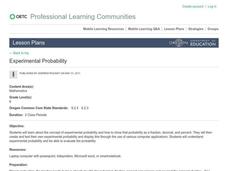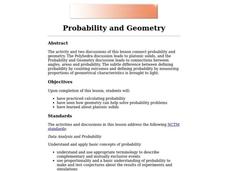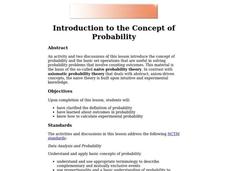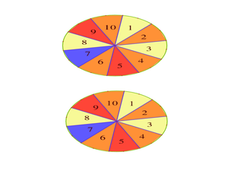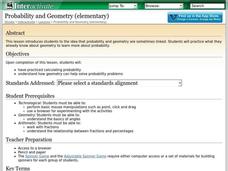EngageNY
Estimating Probabilities by Collecting Data
Take a spin to determine experimental probability. Small groups spin a spinner and keep track of the sums of the spins and calculate the resulting probabilities. Pupils use simulated frequencies to practice finding other probabilities to...
American Statistical Association
Spinners at the School Carnival (Equal Sections)
Spin to win a toy car. A fun activity has pupils use a spinner in which three of the equal sections represent winning a toy car, and the fourth section represents no car. They record the number of wins after certain numbers of spins,...
S2tem Centers SC
Investigating Chance Processes of Probability
How likely is it that the school cafeteria will serve chicken tomorrow? Discover the concept of probability with the roll of the dice. Pupils evaluate the liklihood of several statments about everyday life. Then, a mathematical...
American Statistical Association
Spinners at the School Carnival (Unequal Sections)
Everyone's a winner. Scholars analyze a spinner with five unequal sections, three of which represent winning a toy car and the other two represent winning a toy truck. They conduct an experiment to estimate the number of toy cars and...
EngageNY
Chance Experiments
Class members are introduced to probability using terms such as impossible, unlikely, likely, and certain. Numbers between zero and one are associated with the descriptions of probability. Pupils find the likelihood of chance experiments...
Virginia Department of Education
Probability
Classes explore different scenarios using manipulatives to learn about the difference between independent and dependent probability. Learners experiment with colored chips to model the two types of probabilities. To test their...
Curated OER
Simple Probability
Students explore simple probability. Each student spins a spinner and records the result as they enter the room. The recorded results are used to calculate experimental probabilities. After the teacher explains how to calculate...
Curated OER
Experimental Probability
While just a simple lesson plan, this activity on experimental probability could provide a way to connect this concept to real life. Learners begin by participating in a probability activity using a coin, and then move on to create their...
Curated OER
Mystery Spinners
Take a spin with probability. Given a set of clues about the probability of events on a spinner, groups create their own device to match the clues. Using a jigsaw strategy, groups share their spinners and strategies with other...
Curated OER
Probability and Geometry
Students explore the ways Geometry can help solve probability problems. Students describe platonic solids and practice calculating probability using an online resource. They construct dice with various numbers of sides to demonstrate...
Curated OER
Probability and Applications of Simulations
Middle schoolers apply properties of probability to the real world. In this probability lesson, learners simulate the construction of empirical distribution. They collect and analyze data using central tendencies.
Curated OER
Introduction to the Concept of Probability
Middle and high schoolers have a clarified definition of probability, they explore about outcomes in probability and how to calculate experimental probability. They use computers to learn about probability.
Curated OER
Probability Experiment Simulation: Design and Data Analysis Using a Graphing Calculator
Seventh graders simulate probability experiments. Using a graphing calculator, 7th graders design, conduct, and draw conclusions from simulations or probability experiments. Students construct frequency tables and compare the...
Curated OER
Probability
Second graders experiment with probability. In this probability lesson, 2nd graders pick colored beans from a bag to find the chance of getting different colors. They make fair and unfair spinners and record the data after spinning...
EngageNY
Chance Experiments with Outcomes That Are Not Equally Likely
The fifth portion of the 25-part series introduces probabilities calculated from outcomes that are not equally likely. Class members use tables to calculate probabilities of events, add outcome's probabilities, and find...
Curated OER
Probability of Childhood Games
Middle schoolers explore the concept of probability. In this probability lesson, students find the probability of certain situations including spinning a spinner, drawing marbles from a bag, and rolling a dice.
Curated OER
Spinning Probability
Sixth graders study the concept of probability. In this probability lesson, 6th graders create spinners that match specific sets of clues. Students use their spinners and worksheets to explore and predict probability.
Curated OER
Probable Outcomes
In this math literacy worksheet, 6th graders find the possible outcomes for the spinners in the variety of 6 word problems using the multiple choice format.
Curated OER
Calculating and Applying Basic Probability
Eighth graders investigate the basic concepts of probability. In this probability lesson plan, 8th graders learn the associated probability. They work with spinners, colored cubes in a bag, flip coins, and choose colored candies while...
Curated OER
Probability and Geometry
Learners examine the relationship between probability and geometry to solve problems. In this geometry and probability lesson, students investigate the effect of changing percentages on a spinner to the probability of landing on a...
Curated OER
Data Analysis and Probability
Students design models to simulate actual events using various random devices. They estimate the likelihood of a particular outcome using results of simulation. In addition, they simulate the births of three children to a using a coin.
Curated OER
Probability
Students explore probability. For this probability lesson, students define theoretical probability and experimental probability. Students predict outcomes of hands on activities using coins and colored tiles, complete a chart...
Curated OER
Ideas That Lead to Probability
Students explore and define the concept of probability. They utilize a random number generator to determine the fairness of a game. Internet and printable versions fo the activities are included.
Curated OER
Calculating Theoretical & Experimental Probability
Students collect data by conducting a survey of fellow classmates. They investigate the relationship between estimates obtained from samples and theoretical probabilities. Answer keys included.







